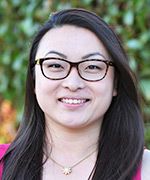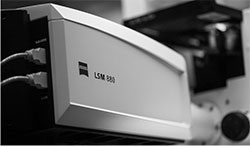Elisa T. Zhang, Ph.D.
Research Interests
Although the uterus is essential for mammalian reproduction and gynecological health, its remarkable functions remain a mystery. The uterine lining or endometrium scarlessly regenerates over ~400 menstrual cycles in a lifetime in preparation for pregnancy, during which the uterus regulates embryo implantation and formation of the placenta, the specialized organ connecting mother and fetus. In spite of these remarkable capabilities, the mechanisms of endometrial renewal and of embryo implantation remain unknown. Understanding these questions will provide crucial information on menstrual and pregnancy disorders, infertility, and uterine wound healing. Injury to the uterus occurs from procedures such as C-sections and leads to implantation failure, placenta previa, and placenta accreta. Using mouse in vivo and human in vitro organoid models, we will first investigate how the uterus heals following injury and how embryonic defects arise in an injured environment. We will then identify stem cell populations of the endometrium and how they contribute to injury repair. Lastly, having developed the first organoids to capture the full complexity of the human endometrium – epithelial, stromal, and immune populations – we will apply this advanced model to investigate the role of the endometrium in health and disease. Most importantly, these organoids will revolutionize our understanding of human embryo implantation when most pregnancies fail and that cannot otherwise be accessed experimentally. By 1) examining how embryonic and placental defects arise in a damaged uterus, 2) investigating uterine wound healing and uterine regeneration during physiological cycling, and 3) modeling embryo implantation, my lab will combine innovative functional approaches to advance our knowledge of uterine:embryo dialogue and uterine regenerative biology in health and disease. We will take a comparative approach to all of these questions, particularly to address the intriguing structural and cellular diversity of mammalian uteri and placentas. Overall, our work carries many broader implications for wound healing, evo-devo, mammalian stem cell biology, development, tumorigenesis, and cell-cell signaling.
E.T. Zhang (2024). "Mouse Surgical Model of Mechanical Uterine Injury and Subsequent Embryo Defects". Current Protocols in Mouse Biology. doi.org/ 10.1002/cpz1.1044
E.T. Zhang, K.L. Wells, A.J. Bergman, E.E. Ryan, L.M. Steinmetz, J.C. Baker (2024). "Uterine injury during diestrus leads to embryo spacing defects and perturbations in the COX pathway in subsequent pregnancies". Biology of Reproduction. doi.org/10.1093/biolre/ioae001
E.T. Zhang, R.L. Hannibal, K.M. Badillo-Rivera, K. McGowan, J.H.T. Song, X. Zhu, G. Meinhardt, M. Knöfler, J. Pollheimer, A.E. Urban, A. Folkins, D.J. Lyell, J.C. Baker (2021). "PRG2 and AQPEP are misexpressed in fetal membranes in placenta previa and percreta". Biology of Reproduction. 105(1):244-257.
R. Polak, E.T. Zhang, C.J. Kuo (2024). "Organoid 2.0: advances in human organoid systems representing the immune microenvironment of cancers". Nature Reviews Cancer. 24:523-539. doi.org/10.1038/s41568-024-00706-6
A.J.M. Santos, V.v. Unen, Z. Lin, N. Ha, A. Batish, J.E. Chan, S.M. Chirieleison, Q. Mu, J.L. Cedano, A. Guh-Siesel, M. Tomaske, E.T. Zhang, S.S. Choi, A. Christophersen, A. Baghdasaryan, K.E. Yost, K. Karlsson, A. Ha, J. Li, H. Dai, Z.M. Sellers, H.Y. Chang, J.C.Y. Dunn, B.M. Zhang, E.D. Mellins, L.M. Sollid, N.Q. Fernandez-Becker, M.M. Davis, C.J. Kuo (2024). "A human autoimmune organoid model reveals IL-7 function in celiac disease". Nature. doi.org/10.1038/s41586-024-07716-2
M.A. Nieves-Colón, K.M. Badillo Rivera, K. Sandoval Mendoza, V. Villanueva Dávalos, L.E. Enriquez Lencinas, J.W. Chen, E.T. Zhang, A. Sockell, P. Ortiz Tello, G.M. Hurtado, R. Condori Salas, R. Cebrecos, J.C. Manzaneda Choque, F.P. Manzaneda Choque, G.P. Yábar Pilco, E. Rawls, C. Eng, S. Huntsman, E.G. Burchard, G. Poletti, C. Gallo, C.D. Bustamante, J.C. Baker, C.R. Gignoux, G.L. Wojcik, A. Moreno-Estrada (2022). "Clotting factor genes are associated with preeclampsia in high altitude pregnant women in the Peruvian Andes". AJHG. 109(6):1117-1139.
E.T. Zhang, Y. He, P. Grob, Y.W. Fong, E. Nogales, R. Tjian (2015). "Architecture of the human XPC DNA repair and Stem Cell Coactivator Complex". PNAS. 112(48):14817-22.
C. Cattoglio, E.T. Zhang, I. Grubisic, K. Chiba, Y.W. Fong, R. Tjian (2015). "Functional and mechanistic studies of XPC DNA-repair complex as transcriptional coactivator in embryonic stem cells". PNAS. 112(18):E2317-26.
S.C. Knight, L. Xie, W. Deng, B. Guglielmi, L.B. Witkowsky, L. Bosanac, E.T. Zhang, M. El Beheiry, J.-B. Masson, M. Dahan, Z. Liu, J. Doudna, R. Tjian (2015). "Dynamics of CRISPR-Cas9 Genome Interrogation in Living Cells". Science. 350(6262):823-826.
M. Hondele, T. Stuwe, M. Hassler, F. Halbach, A. Bowman, E.T. Zhang, B. Nijmeijer, C. Kotthoff, V. Rybin, S. Amlacher, E. Hurt, A.G. Ladurner (2013). "Structural basis of histone H2A-H2B recognition by the essential chaperone FACT". Nature 499:111-114.
T. Chu, M. Chiu, E. Zhang, S. Kunes (2006). "A C-terminal motif targets Hedgehog to axons, coordinating assembly of the Drosophila eye and brain". Dev Cell 10:635-646.
T.A. Day, E.T. Zhang, C.T. Ruhland (2007). "Exposure to solar UV-B radiation accelerates mass and lignin loss of Larrea tridentata in the Sonoran Desert". Plant Ecology 193: 185-194.
- 2024 2nd place winner, Stanford Postdoc Symposium
- 2023 Selected Speaker: Ethel Browne Harvey Postdoctoral Seminar Series, SDB
- 2018 Henzl-Gabor Young Women in Science Fund for Postdoctoral Scholars Travel Award
- 2017 A.P. Giannini Foundation Postdoctoral Fellowship
- 2017 NIH F32 Postdoctoral Fellowship – 6th percentile score (declined)
- 2017 SPARK scholar, Stanford University
- 2017 Dean’s Postdoctoral Fellowship, Stanford University
- 2016 Child Health Research Institute Postdoctoral Award and Grant, Stanford University
- 2015 UC Berkeley Alan J. Bearden Award for the outstanding dissertation on a biophysical topic
- 2012 UC Berkeley Outstanding Graduate Student Instructor Award
- 2009 NSF Graduate Research Fellow
- 2009 UC Berkeley Distinguished Fellow
- 2008 Fulbright Research Fellow
- 2008 Thomas Temple Hoopes Prize for Outstanding Senior Thesis
- 2006 Radcliffe Fellowship
- 2006 Fellow, Harvard Program for Research in Science and Engineering (PRISE)
- 2006-2008 Fellow, Harvard College Research Program





 Make a donation using our secure online system.
Make a donation using our secure online system.